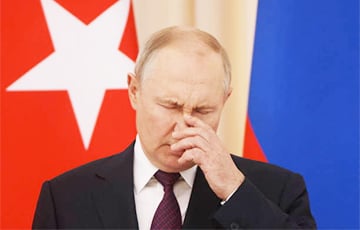Putin Turns From Asset Into Burden For His Supporters
- 21.08.2024, 12:28
- 4,858

Russian elites are in a state of ‘disgruntled consensus’.
The Ukrainian military's successful actions in Kursk region are causing alarm among Vladimir Putin's supporters, questioning their confidence in the dictator's ability to maintain control.
As AP notes, during his 24 years in power, Putin has built an image of a leader capable of ensuring security and stability in Russia. However, that image began to erode with the outbreak of war, especially after the Yevgeny Prigozhin armed rebellion and the recent terrorist attack on a Moscow concert hall.
‘While the state television is still providing strong support for Putin despite setbacks such as the Kursk invasion, it is harder to gauge the opinion of his key constituency - Russia's elite,’ AP writes.
Ekaterina Shulman of the Carnegie Eurasia Centre says Putin depends on their approval.
‘They are thinking around the clock about whether the status quo is favourable to them or not,’ she said.
Since the war began, the life of these elites - Putin's inner circle, top bureaucrats, security and military officials, and business leaders - has become worse, not better. While many have enriched themselves from the war, they have fewer places to spend their money because of Western sanctions.
The question they ask themselves about Putin, Shulman says, is ‘whether the old man is still an asset or already a burden.’
Nigel Gould-Davies of the International Institute for Strategic Studies in London says Russian elites are now in a state of ‘disgruntled consensus’ but fear who will win if a leadership struggle breaks out.
Analysts say they may hope that Putin's response to the events in Kursk follows a pattern in which he is initially slow to react to a crisis before eventually gaining the upper hand.
Given the suppression of domestic dissent and his firm control of the media, Putin can afford to make the ‘absolutely cynical’ decision to ignore what is happening in Kursk region, Shulman says.
Nevertheless, Eugene Roemer, a research fellow and director of the Carnegie Programme, said Putin's power is ‘unlikely to be weakened by this humiliation’ because the entire political and military power vertical in Russia is complicit in his war and bears shared responsibility for the disaster.
However, as Ukraine ramps up its offensive, it may become difficult for the Kremlin to ignore the war's many consequences. The key question, Gould-Davis says, is what happens if the Russian elite concludes that the war ‘cannot be won or if it will never end as long as Putin is in power.’











